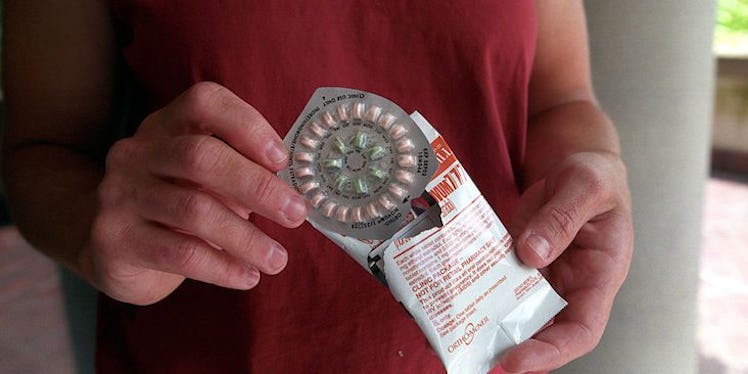
The Trump Admin Took Another Major Swipe At Birth Control For Young Women
Last week, the U.S. Department of Health and Human Services (HHS) slashed almost $214 million in funding for programs and projects to help prevent teen pregnancy, Reveal reports.
On the chopping block were 81 grantees that comprise the Teen Pregnancy Prevention (TPP) programs that were given five-year grants in 2015 under former President Barack Obama. These programs were designed to find evidence-based methods to help prevent teen pregnancy.
In a statement about these cuts to the TPP programs obtained by Elite Daily, The National Campaign to Prevent Teen and Unplanned Pregnancy's CEO Ginny Ehrlich says,
There is nothing in this bill that will advance progress on these issues … These funding cuts are short-sighted and will harm millions of women and youth — especially our most vulnerable youth.
Grantees listed in the TPP program on the HHS website include organizations such as local Planned Parenthood branches and the Institute of Women and Ethnic Studies in New Orleans, which works to reduce teen pregnancy and STI rates among African American and Latino youth.
The Trump administration's latest cuts will wipe out years' worth of work and research. The funding cutoff date for many of these is now as soon as June 2018; others had their budgets cut effective immediately, according to Reveal.
To make matters worse, some of these projects are research-based on five-year timelines, so stopping prematurely means the data sets will be invalid.
Rachel Fey, director of policy for the National Campaign to Prevent Teen and Unplanned Pregnancy, tells Elite Daily that the HHS's announcement to stop funding so abruptly is an anomaly. Normally, funding decisions like this are made after and with the approval of Congress. She says,
If you pull the rug out from those grants halfway through, you're essentially building half a skyscraper and then walking away. You won't know whether they work or not, and will have wasted [all that] money.
But the cuts may have other side effects to policy as well. The TPP represents the "gold standard" in a new wave of policymaking that focused on scientific proof, Fey says, and eliminating its funding would also erode the emerging evidence-backed approach. Of the TPP program, she says,
Why mess with success? We're seeing such progress from these programs…Why would we walk away from that?
Currently, about half of all pregnancies in the United States are unintended, according to the Center for Disease Control (CDC), and the rates for teens are even higher -- a whopping 98 percent. Research shows shows that 1 in 4 Americans will become pregnant by age 20, and rates are higher for women of color and those with lower incomes and education levels.
Teen pregnancy rates tend to be highest in places with abstinence-only education. Take Texas, for example, where sex education and access to reproductive healthcare is slim: teen pregnancy rates are around 50 percent higher than the national average. Contrast that with the case of Colorado, where a program offering free birth control led to a 40 percent drop in the state's teen pregnancy rate.
This latest cut to teen pregnancy funding came without much uproar or recognition -- and at a crucial time.
The Senate is embroiled in a battle to get its version of the healthcare bill passed to repeal and replace the Affordable Care Act (aka Obamacare). The Republicans' proposal, called the Better Care Reconciliation Act (BCRA), would strip Medicaid funding from Planned Parenthood, potentially leading to thousands of births. BCRA would also mean a huge rollback in protections for patients who already use birth control, potentially burdening women with enormous bills for contraceptive care.